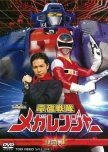Everything the show did well:
-Really likeable cast overall in both the heroes and villains.
-The twist with the main villains is pretty good.
-The high-school setting is done differently from the previous 2 attempts, this and the nasacore elements that the show has makes it stand out form other Sentai.
-Most monsters of the week are entertaining.
-Consistently good action, especially on the mecha. The team also has a pretty unique powerset for the on ground fights.
Everything the show did bad:
-Not the most unique plot.
-After the extra ranger MegaSilver is able to overcome his time-limit issue there's barely any reason for him to not appear to help the rangers, luckily this happens so late that it only feels off for a few episodes.
Reasons for the show's strengths:
With the rise of the internet and digital devices in 1995, main producer Shigenori Takatera wanted to push this theme as the center piece of the show in order to teach kids about these technogical advancements. However this theme was a bit too abstract and the staff struggled a bit during the pre-production.
Due to Super Sentai now being adapted into Power Rangers, Takatera decided to add space elements into the show which helped with the mecha production, although they had to make the first mecha a 3-piece combiner in order to release a cheaper toy due to problems with the economy.
TV Asahi producer Taro Iwamoto came up with the show having a high-school setting in order to increase viewership. This help the show to have a concrete setting. Main producer Shigenori Takatera decided to make this the main focus of the show in order deferentiate from the previous high-school Sentai Turboranger, who were heroic highschoolers but said show didn't emphasize the highschool as the main setting.
Due to insistance of assistant producer Naomi Takebe and side writer Yasuko Kobayashi, the show emphasized on giving proper focus and character arcs on all members of the team, and decided on the team having a different dynamic where the black ranger Kouichirou is the leader and yellow ranger Chisato serves as the second in command in spite of the red ranger Kenta being the main protagonist.
Reasons for the show's problems:
While main writer Junki Takegami is really great at writing characters, he tends to take a safe direction for the plot of his stories.
At the time the Super Sentai franchise had this quota where the extra ranger couldn't have that much screen time in order to not disrupt the team dynamic of the main team. While this show handled it in a more organic way than Dairanger and Ohranger, it still wasn't optimal.
Overall:
While a safe show overall, it's still a really great show and would highly recommend to any Super Sentai fan or if you're into highschool settings in dramas.
-Really likeable cast overall in both the heroes and villains.
-The twist with the main villains is pretty good.
-The high-school setting is done differently from the previous 2 attempts, this and the nasacore elements that the show has makes it stand out form other Sentai.
-Most monsters of the week are entertaining.
-Consistently good action, especially on the mecha. The team also has a pretty unique powerset for the on ground fights.
Everything the show did bad:
-Not the most unique plot.
-After the extra ranger MegaSilver is able to overcome his time-limit issue there's barely any reason for him to not appear to help the rangers, luckily this happens so late that it only feels off for a few episodes.
Reasons for the show's strengths:
With the rise of the internet and digital devices in 1995, main producer Shigenori Takatera wanted to push this theme as the center piece of the show in order to teach kids about these technogical advancements. However this theme was a bit too abstract and the staff struggled a bit during the pre-production.
Due to Super Sentai now being adapted into Power Rangers, Takatera decided to add space elements into the show which helped with the mecha production, although they had to make the first mecha a 3-piece combiner in order to release a cheaper toy due to problems with the economy.
TV Asahi producer Taro Iwamoto came up with the show having a high-school setting in order to increase viewership. This help the show to have a concrete setting. Main producer Shigenori Takatera decided to make this the main focus of the show in order deferentiate from the previous high-school Sentai Turboranger, who were heroic highschoolers but said show didn't emphasize the highschool as the main setting.
Due to insistance of assistant producer Naomi Takebe and side writer Yasuko Kobayashi, the show emphasized on giving proper focus and character arcs on all members of the team, and decided on the team having a different dynamic where the black ranger Kouichirou is the leader and yellow ranger Chisato serves as the second in command in spite of the red ranger Kenta being the main protagonist.
Reasons for the show's problems:
While main writer Junki Takegami is really great at writing characters, he tends to take a safe direction for the plot of his stories.
At the time the Super Sentai franchise had this quota where the extra ranger couldn't have that much screen time in order to not disrupt the team dynamic of the main team. While this show handled it in a more organic way than Dairanger and Ohranger, it still wasn't optimal.
Overall:
While a safe show overall, it's still a really great show and would highly recommend to any Super Sentai fan or if you're into highschool settings in dramas.
Was this review helpful to you?



